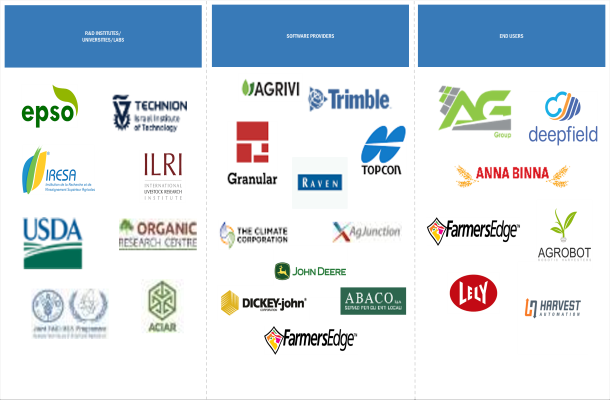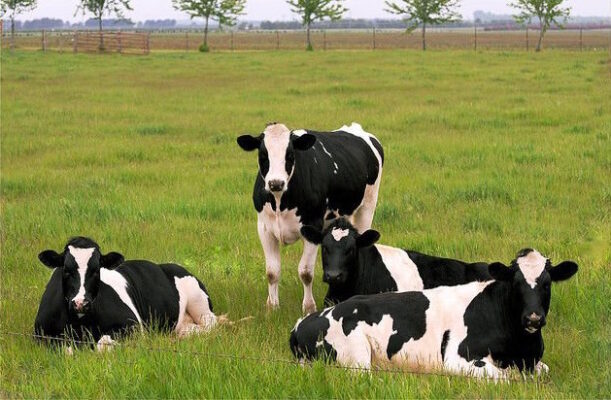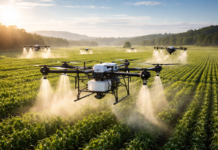According to MarketsandMarkets, the Farm Management Software (FMS) Market is projected to reach USD 5.8 billion by 2029 from USD 3.4 billion in 2024, growing at a CAGR of 11.0%. The Farm Management Software (FMS) market is evolving rapidly, driven by advancements in technology and the growing need for sustainable, data-driven farming solutions. Geographic Information System (GIS)-based agriculture is one of the industry’s most transformative technologies. GIS integrates spatial data, remote sensing, and advanced mapping tools to provide farmers with precise insights into soil conditions, crop health, and resource allocation. This technology has revolutionized decision-making by enabling detailed analysis of large-scale agricultural landscapes, helping farmers optimize inputs and reduce environmental impact.
The global agriculture industry has witnessed tremendous advancements in smart farming technologies in recent years. Rising pressure to meet the increasing food demand with limited resources is one of the major factors responsible for the growing adoption of cutting-edge technologies, such as the Internet of Things (IoT), artificial intelligence (Al), drones, and hyperspectral imaging, by farm owners. The use of these technologies in farming helps increase production, enhance production efficiency, minimize wastage of resources, and improve accuracy and precision while providing high profitability to farm owners.
Artificial intelligence (Al) emerges as a promising technology to meet the ongoing food demand in agriculture by boosting production. Al solutions enhance the efficiency of agricultural operations by offering valuable insights. By combining IoT with advanced analytics facilitated by Al, farmers can analyze real-time data concerning weather conditions, temperatures, moisture levels, and crop prices in the market. Al technologies also aid farmers in accurately pinpointing anomalies within fields. Sophisticated software captures numerous visible and infrared images of each field and processes them through an algorithm, generating a comprehensive image that highlights damaged areas or those in need of additional nutrients. Once issues within a field are identified, farmers can concentrate on treating those areas, ultimately enhancing efficiency and productivity.
NEW REVENUE POCKETS FOR PLAYERS IN FARM MANAGEMENT SOFTWARE MARKET
Source: Secondary Research, Interviews with Experts, and MarketsandMarkets Analysis
Sustainability is a key driver in the FMS market. Software solutions are designed to enhance resource efficiency by reducing water, fertilizer, and pesticide usage while maximizing crop output. The growing accessibility of mobile-friendly platforms is another pivotal trend, bridging the gap for farmers in remote areas to leverage advanced farming technologies. This focus on inclusivity supports the global shift towards digital agriculture, ensuring that technological advancements are accessible to smallholder farmers. The FMS market is also being propelled by several global drivers.
The most prominent is the need to address growing food demand, with the global population expected to surpass 9 billion by 2050. This necessitates innovative solutions to boost agricultural productivity sustainably. Governments worldwide are encouraging the digitization of agriculture through policy incentives and subsidies, further accelerating the adoption of FMS solutions. Moreover, the drive to reduce operational costs is a strong motivator for farmers to adopt these systems, as they help optimize inputs such as seeds, water, and fertilizers, leading to improved profitability. Enhanced smartphone penetration and better internet connectivity in developing regions provide fertile ground for the expansion of FMS, targeting previously untapped markets.
The farm management software market is highly diversified and fragmented, with the presence of many market players, ranging from startups to small, medium-sized, and large enterprises. However, the bigger firms in the farm management software market are continuously acquiring small players in an attempt to expand their offerings. The cloud-based delivery model has revolutionized the agriculture industry and increased the reach of companies to various emerging regions. Over the years, farmers or growers have been adopting different types of farm management software to optimize their farming operations.
ECOSYSTEM: FARM MANAGEMENT SOFTWARE MARKET
Source: MarketsandMarkets Analysis
The FMS market has witnessed numerous significant developments marked by strategic mergers, acquisitions, and partnerships. The top companies have leveraged organic and inorganic growth strategies to expand their product portfolios and geographic reach. In October 2023, AGRIVI joined forces with ReddAgro, a leading Agri-Tech firm known for its expertise in precision farming, greenhouse control and automation, and agricultural supply chain management solutions. Together, they aim to transform farming methods, fostering innovation and sustainability across the agricultural sector in Jordan, Sudan, Saudi Arabia, Egypt, and Iraq. ReddAgro and AGRIVI are aligned in their vision of a more sustainable and efficient agricultural future. In September 2023, Trimble Inc. officially disclosed a definitive agreement to establish a joint venture with AGCO, aiming to enhance support for farmers in the mixed fleet precision agriculture market through factory-fitted and aftermarket applications. Trimble and AGCO share the vision of creating a global leader in smart farming and autonomy solutions for mixed fleets. Furthermore, established players like Trimble Inc., AGRIVI, Granular Inc., Raven Industries, Inc., Climate LLC, and AgJunction LLC are leveraging AI and precision tools to strengthen their offerings. Collaborations between drone manufacturers and FMS providers are streamlining data collection and analysis, while startups, including CropX Inc., are innovating niche solutions tailored for small and mid-sized farms.
In conclusion, the Farm Management Software market is at the forefront of agricultural innovation, driven by technologies like GIS, AI, drones, and big data analytics. With the integration of real-time monitoring tools and government support, FMS solutions are transforming farming practices globally. As climate change and food security challenges intensify, the demand for advanced, sustainable solutions will continue to grow. For FMS providers, this evolving landscape presents a golden opportunity to innovate and expand their offerings, shaping the future of smart agriculture.








